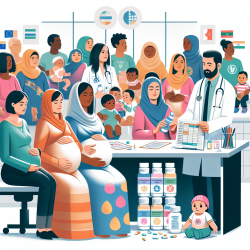The plight of refugees is a global concern, with millions displaced due to conflict and instability. Among the myriad challenges they face, access to reproductive health care stands out as a critical issue. A recent study titled "Reproductive health care utilization among refugees in Jordan: Provisional support and domestic violence" sheds light on the complexities of providing such care in refugee settings.
The Context of Refugee Health in Jordan
Jordan hosts one of the largest refugee populations in the world, with many residing in camps managed by the United Nations Relief and Works Agency (UNRWA). The study reveals that while UNRWA provides substantial reproductive health services, challenges remain, particularly in addressing domestic violence and social dynamics within refugee communities.
Key Findings from the Research
- Access to Resources: Refugee women serviced by UNRWA have greater access to family planning and contraceptive resources compared to their counterparts in urban and rural areas.
- Domestic Violence: Despite better access to health resources, refugee women often experience higher rates of domestic violence, highlighting a critical area for intervention.
- Social Dynamics: The study suggests that while provisional resources are easier to provide, addressing social issues like identity loss and family dynamics poses significant challenges.
Implications for Practitioners
The findings underscore the need for a holistic approach to refugee health care. Practitioners should consider both the provision of medical resources and the social context of refugees. Here are some actionable steps practitioners can take:
- Enhance Training: Equip health care workers with skills to address not only medical needs but also social issues such as domestic violence.
- Collaborate with NGOs: Work closely with organizations like UNRWA to develop comprehensive programs that integrate social support with medical care.
- Conduct Further Research: Encourage ongoing research into the social determinants of health among refugees to inform policy and practice.
The Role of Organizations Like UNRWA
UNRWA's extensive network offers a model for how organizations can effectively deliver health services in challenging environments. However, the research highlights that addressing domestic violence requires more than just medical intervention; it demands a concerted effort to change cultural norms and provide social support.
The Path Forward
This research serves as a call to action for practitioners and policymakers alike. By understanding the unique challenges faced by refugees and leveraging successful models like those implemented by UNRWA, we can improve health outcomes for some of the world's most vulnerable populations.
To read the original research paper, please follow this link: Reproductive health care utilization among refugees in Jordan: Provisional support and domestic violence.










